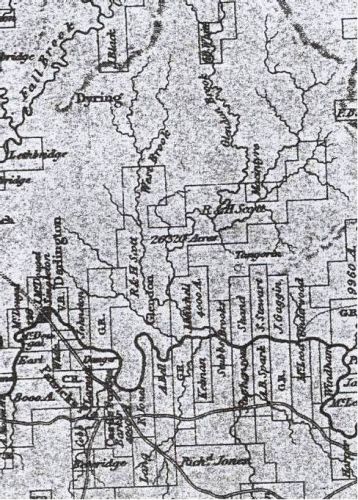Archibald Bell - Settler
Corinda - Map 3
Arrival in Australia
He arrived in Australia with his family on board the Young William when he was three years old. His father Archibald Bell served with the N.S.W. Corp, and as a military commander at the Hawkesbury and Magistrate at Windsor.Bell's Line of Road
In 1823 Archibald junior discovered a new route across the Blue Mountains from Richmond to Cox's River. This became known as the Bell's Line of Road and became the cattle road of the north and west. He also explored the Hunter River district. For his discovery of the track across the Blue Mountains he was granted 1000 acres which was selected near Singleton and called Corinda. The location can be seen below centre on the map -
St. Helier's
In 1828 Archibald junior was a tenant and employed as an overseer at St. Heliers, the estate of Colonel Henry Dumaresq near Scone. Convicts were assigned to him at St. Heliers and also at Corinda where he built a two story stone house, probably with the use of convict labour.Marriage
One sister, Mary Ann Fennell married Francis Little of Invermein in 1831. In 1833, the same year his sister Sophie married Henry P. Dutton, Archibald Bell junior married Francis Ann North, daughter of Windsor Magistrate Lieutenant Samuel North.Singleton
Archibald Bell jun. and Henry P. Dutton were active in Singleton community life attending meetings such as the Patrick Plains Turf Club and served as Trustees for the Singleton Church. Archibald Bell was nominated for district council and was a Steward at the Patrick Plains Races.In 1847 along with other prominent settlers, Archibald Bell jun. was introduced to the Governor Sir Charles Fitzroy on his visit to the district.
Corinda
On the centenary of the founding of Singleton, Corinda was described -The house was a long two storied building facing the river and was built of stones quarried at Glendon and brought across the river in punts. When Corinda homestead had fallen to decay (for Mr. Bell returned to Belmont, and this estate passed from his family), the stones were removed to Belford to build the Church of England there, so that it forms an interesting link with the past. [1]
Archibald Bell was renown for his coach and hackney horses which he bred at Corinda. He owned other properties in the Valley and later moved to Milgarra and then to Pickering near Merton, the former estate of Captain John Pike.
Death
Archibald's wife Frances North Bell died at Milgarra in December 1852 age 27. Archibald Bell died at Pickering on 9th August 1883.....The Hon. Archibald Bell M.L.C., whose death was announced in our columns yesterday, was an old colonist, and a son of Mr. Archibald Bell, who was a member of the old Council before the days of Parliamentary elections. About 14 years ago Mr. Bell entered the Legislative Assembly as a representative of the Upper Hunter, for which electorate he was never defeated. Subsequently he retired from the active political arena of the Assembly, and entered the Legislative Council in October 1879 and was a member at the time of his decease. Though not a prominent politician or in the habit of speaking much in the House, Mr. Bell performed his legislative duties conscientiously, and both in and out of Parliament he was popular among all classes for his courtesy and amiable temperament. His age at the time of his death was about 80.[2]
James Millar purchased Corinda from Archibald Bell.
Notes and Links
1). Archibald Bell senior's Tombstone - Windsor and Richmond Gazette 15 Jun 1895Map of the Hunter in 1828 showing location of Archibald Bell's estate. Shown as Kurrandarra on the map
References
[1]. Singleton Argus 16 March 1920[2]. Sydney Morning Herald 11 August 1883
Assigned Convict Servants
The following men were assigned to Archibald Bell junior. The Records aren't always specific as to which estate the convicts were assigned. Some were assigned to Bell when he was employed as Superintendent at St. Heliers, others at Segenhoe / Invermein, and the rest to his estate, Corinda. Workers may not have remained on the same estates they were assigned to. They were often transferred or loaned to different farms and stations at harvest and shearing times. Some may have also been assigned to Archibald Bell senior's estate Belmont at Richmond as well.They were convicts and ex-convicts unless otherwise stated. Transportation of convicts ceased in 1840 and there were fewer convicts assigned afterwards although many remained the district as they worked out their sentence until the 1850s. The list below states Ship and Year of arrival; the name of the Estate, year of assignment and occupation are included where known:
↑